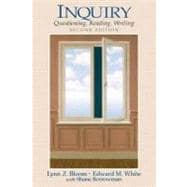
(NOTE: Each chapter begins with an Introduction, Rhetorical Issues, and Questions for Discovery and Discussion, and concludes with Questions for Reflection, and Writing.)
Introduction.
1. Identity: How Do I Know Who I Am?
What Is My Physical Self?
Who Am I in Relation to Others?
How Do Language and Literacy Affect My Identity? Amy Tan, Mother Tongue. Eudora Welty, Listening. Richard Wright, The Power of Books. Richard Rodriquez, Aria.
2. Thinking: How Do We Know What We Know?What is the Process of Thinking?
What Governs Ethical Behavior?
What Are Some Operative Principles of Work and Play?
What Are Fundamental Human Rights?
What Values Govern the Common Good?
How Can Value Conflicts Be Resolved?
How Does Family Heritage Affect Who We Are?
How Can We Live in Harmony With Nature?
How Can We Interpret and Understand the Past?
How Can We Think About Technology and Gender Roles in the Future?
Will War and Terrorism Shape Our Future?
Will a New Utopia be Possible in the 21st Century?
The New copy of this book will include any supplemental materials advertised. Please check the title of the book to determine if it should include any access cards, study guides, lab manuals, CDs, etc.
The Used, Rental and eBook copies of this book are not guaranteed to include any supplemental materials. Typically, only the book itself is included. This is true even if the title states it includes any access cards, study guides, lab manuals, CDs, etc.